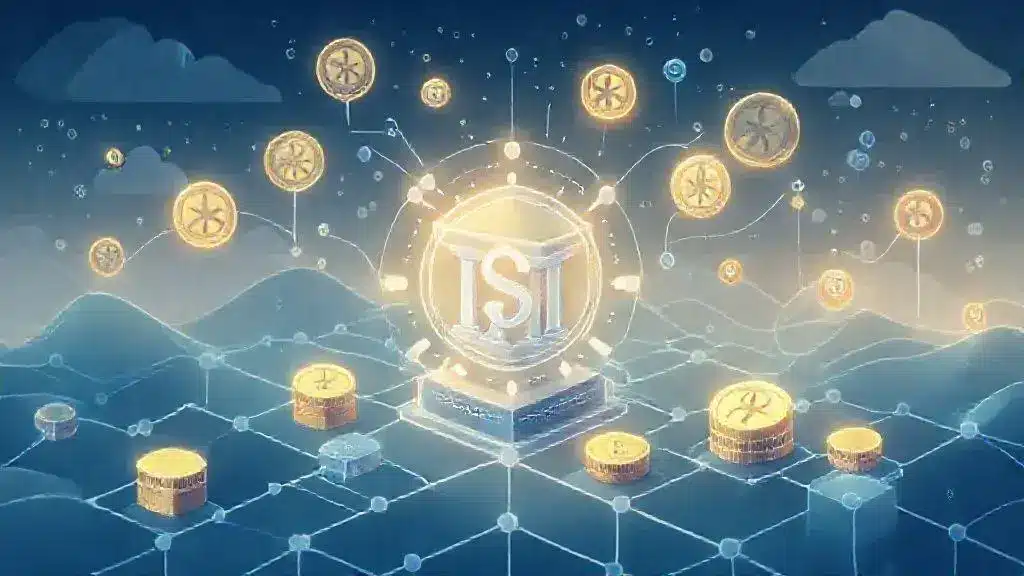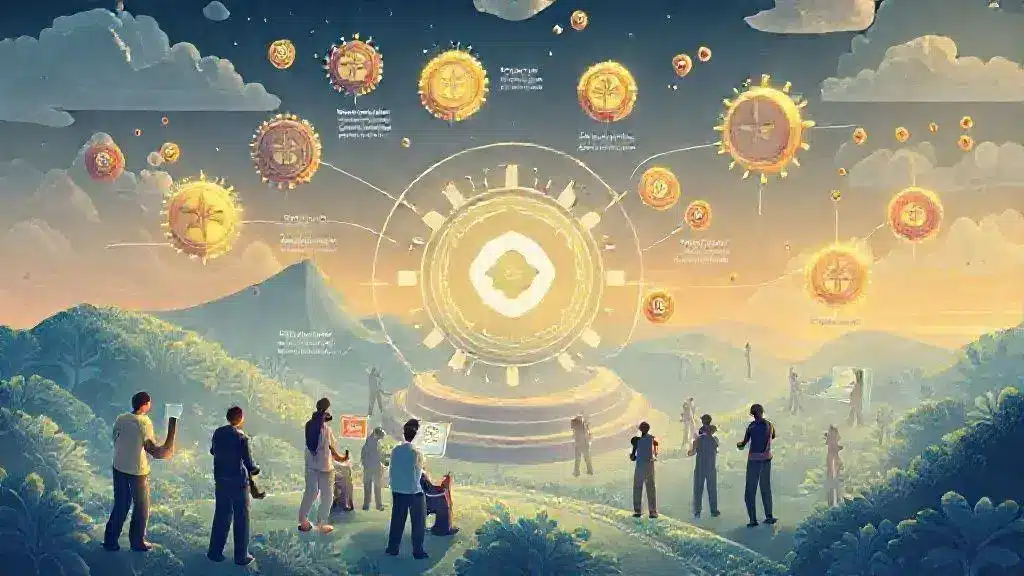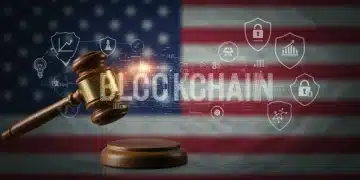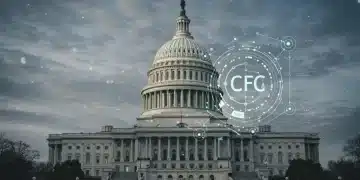DeFi governance token analysis: a deep dive into trends

DeFi governance tokens are digital assets that enable holders to participate in decision-making for decentralized finance projects, significantly impacting user engagement and the platform’s evolution.
DeFi governance token analysis opens a window into the evolving world of decentralized finance. Have you ever wondered how these tokens impact decision-making in the crypto ecosystem? Let’s explore their significance and trends.
Understanding DeFi governance tokens
Understanding DeFi governance tokens is crucial for anyone looking to navigate the ever-evolving landscape of decentralized finance. These tokens play a significant role in how projects operate and make decisions. Let’s dive deeper into what these tokens are and why they matter.
What are DeFi governance tokens?
DeFi governance tokens are assets that allow holders to participate in the decision-making processes of a decentralized project. Essentially, owning these tokens gives users a voice in how the platform evolves.
These tokens enable various actions, such as:
- Voting on project proposals
- Deciding on key upgrades
- Influencing technical changes
- Participating in profit-sharing models
Having governance tokens means you can shape the direction of the platform. More participation often leads to better decisions that reflect the community’s needs.
How do they function?
Governance tokens typically function on a blockchain platform. The community decides on platform updates through a voting mechanism. When a significant change is proposed, holders vote on whether or not to approve it.
This process is similar to traditional voting in institutions but done digitally and securely on the blockchain. This ensures transparency and gives users confidence that their voices are heard.
It’s essential to understand that not all governance tokens are created equal. Various projects have different voting systems and requirements for token holders. Some may require a certain amount of tokens to participate, while others may provide more accessible voting options.
Additionally, the level of participation in governance can significantly affect the success of the DeFi project. Active community involvement often leads to better governance, resulting in a more resilient and adaptive platform.
In conclusion, grasping the concept of DeFi governance tokens is vital for anyone interested in decentralized finance. These tokens not only empower users but are also fundamental to the evolution and stability of DeFi projects.
The role of governance tokens in decentralized finance
The role of governance tokens in decentralized finance (DeFi) is essential for fostering community engagement and shaping project direction. These tokens empower users by giving them a voice in critical decisions regarding the platform’s future.
Decision-Making Power
With governance tokens, holders can propose changes and vote on various matters affecting the ecosystem. This means that community members can influence how the platform operates.
Key aspects of their role include:
- Participating in voting on protocol upgrades
- Determining how funds are allocated
- Influencing the addition of new features
- Deciding on partnerships and collaborations
This decentralized approach to governance helps distribute power among users, preventing any single entity from having control over the platform.
Encouraging Active Participation
Governance tokens also incentivize active participation. Many platforms reward users for holding and using their tokens, which encourages them to engage in voting and discussions.
By actively participating, token holders help ensure that the platform evolves in a way that reflects the community’s needs and desires. This results in better outcomes for everyone involved, as collective decision-making often leads to more innovative and responsive governance.
Furthermore, the transparency inherent in DeFi governance processes builds trust among community members. When everyone can see how decisions are made, it fosters a sense of shared responsibility and commitment to the project’s success.
Ultimately, governance tokens are a fundamental element of decentralized finance, enabling users to take part in shaping the future of their favorite platforms and creating a more democratic financial system.
Key trends shaping DeFi governance tokens

Key trends are emerging that are shaping DeFi governance tokens and their impact on the decentralized finance landscape. Understanding these trends can help investors and users make informed decisions.
Increasing Popularity of Decentralized Autonomous Organizations (DAOs)
Decentralized Autonomous Organizations, or DAOs, are at the forefront of governance token usage. These organizations allow members to vote on proposals while using the tokens as a means of influence. This creates a more democratic and participatory environment.
Some important aspects of DAOs include:
- Voter participation and engagement
- Proposal creation processes
- Fund allocation decisions
- Impact on project governance
DAOs are becoming the norm as projects strive for greater transparency and community involvement.
Integration with Layer 2 Solutions
Another trend is the integration of governance tokens with Layer 2 solutions. This technology enhances transaction speeds and lowers fees, making it easier for token holders to participate in governance activities.
As more projects adopt Layer 2 scaling solutions, we can expect:
- Increased voter participation
- Lower barriers for engagement
- Enhanced user experiences
These factors drive user adoption, making governance more accessible.
In addition to these trends, there is a growing focus on interoperability among different DeFi protocols. Governance tokens from one platform may interact with other ecosystems. This deeper integration fosters collaboration and innovation across platforms.
Moreover, the functionality of governance tokens continues to evolve. Many projects are incorporating features that allow token holders to earn rewards for participating in governance votes. This encourages more users to get involved, as they see the direct benefits of their engagement.
Staying up-to-date with these key trends can help you navigate the rapidly changing world of DeFi governance tokens and leverage opportunities that arise as the ecosystem matures.
Analyzing risks associated with governance tokens
Analyzing the risks associated with governance tokens is crucial for any investor or user involved in decentralized finance (DeFi). These tokens can present both opportunities and challenges that users must navigate carefully.
Volatility and Market Risks
One major risk is market volatility. The value of governance tokens can fluctuate dramatically due to various factors, including market sentiment and project developments. Understanding these risks helps users make informed decisions.
Key considerations regarding volatility include:
- Price swings that can lead to financial losses
- Impact of external market conditions
- Market manipulation possibilities
Investing in governance tokens might lead to significant gains, but it also holds potential downsides that cannot be ignored.
Regulatory Risks
Another critical risk involves regulatory uncertainty. As governments worldwide explore regulations for cryptocurrencies, the rules surrounding governance tokens could change at any time. This can affect the legality and usability of these tokens.
Some factors that contribute to regulatory risks are:
- Changing legal frameworks
- Possible classification of tokens as securities
- Regional restrictions on token usage
Investors should stay updated on regulations in their jurisdictions to understand how they might impact their governance tokens.
Security risks are also significant within this space. Hackers often target projects for vulnerabilities, which can lead to tokens being stolen or lost. Implementing good security practices is essential for protecting investments.
Finally, governance risks arise when token holders don’t participate effectively in the decision-making process. Low voter turnout can lead to decisions that don’t reflect the community’s views. This can undermine trust and, ultimately, the success of the project.
Being aware of these potential risks allows users to approach governance tokens with caution, equipping them to make better decisions in the dynamic landscape of decentralized finance.
Future outlook for DeFi governance tokens
The future outlook for DeFi governance tokens is promising, with trends indicating growth and evolution in the decentralized finance space. As more people engage with DeFi, the importance of governance tokens is likely to increase.
Growing Adoption
As DeFi platforms become mainstream, more users will see the value of governance tokens. This growth could lead to increased demand and better market stability. With more users comes a greater need for effective governance, ensuring that community voices are heard.
Factors contributing to this adoption include:
- Increased awareness of decentralized finance
- Accessibility of user-friendly DeFi platforms
- Innovative features that reward participation
The next few years could see governance tokens play a central role in the DeFi ecosystem.
Technological Advancements
Additionally, technological advancements will shape the future of governance tokens. These advancements may include improved security measures, more efficient voting systems, and enhanced interoperability among different platforms.
As technology evolves, the governance structures of these tokens may become more sophisticated, allowing for:
- Faster proposal submissions and voting
- Integration with more blockchain networks
- Opportunities for cross-platform governance
A more advanced technical framework will likely lead to improved user experiences.
Moreover, regulatory clarity will play a significant role in the future of DeFi governance tokens. As governments begin to establish clearer rules for cryptocurrencies, governance tokens may find themselves in a more stable legal environment. This could foster confidence and attract more participants.
In summary, the outlook for DeFi governance tokens is bright, driven by increasing adoption, technological innovations, and regulatory clarity. These factors combined will likely strengthen their importance in decentralizing financial governance.
FAQ – Frequently Asked Questions about DeFi Governance Tokens
What are governance tokens in decentralized finance?
Governance tokens are digital assets that allow holders to participate in decision-making processes for DeFi projects. They enable users to vote on proposals and influence the platform’s direction.
How do governance tokens impact user participation?
Governance tokens encourage user engagement by allowing holders to vote on important issues. This fosters a sense of community and ensures that decisions reflect the collective interests of token holders.
What are the risks associated with governance tokens?
The risks can include market volatility, regulatory uncertainty, and security vulnerabilities. Users should understand these risks to make informed decisions when participating in governance.
What is the future outlook for governance tokens?
The future of governance tokens looks promising, with expected growth in adoption, technological advancements, and clearer regulatory frameworks that will enhance user involvement in DeFi.





